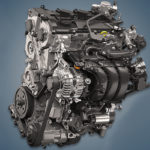The 1.0-liter Toyota 1KR-FE engine has been assembled since 2004 in Japan and Poland for a wide range of compact models. The aluminum three-cylinder engine with a timing chain drive is equipped with a proprietary VVT-i variable valve timing system only on the intake shaft.
The KR family also includes engines: 1KR‑DE and 1KR‑VE.
The engine was installed on:
- Toyota Aygo 1 (AB10) in 2005 – 2014; Aygo 2 (AB40) since 2014;
- Toyota Belta 1 (XP90) in 2005 – 2012;
- Toyota iQ 1 (GJ10) in 2008 – 2015;
- Toyota Yaris 2 (XP90) in 2005 – 2011; Yaris 3 (XP130) since 2011;
- Daihatsu Sirion M300 in 2004 – 2010; Sirion M600 in 2010 – 2016; Sirion M700 since 2016;
- Daihatsu Cuore L275 in 2006 – 2016;
- Peugeot 107 I (B0) in 2005 – 2014; 108 I (B3) since 2014;
- Citroen C1 I (B0) in 2005 – 2014; C1 II (B4) since 2014.
Specifications
| Production years | since 2004 |
| Displacement, cc | 996 |
| Fuel system | injector MPI |
| Power output, hp | 68 – 71 |
| Torque output, Nm | 90 – 94 |
| Cylinder block | aluminum R3 |
| Block head | aluminum 12v |
| Cylinder bore, mm | 71 |
| Piston stroke, mm | 84 |
| Compression ratio | 10.5 |
| Features | ETCS-i |
| Hydraulic lifters | no |
| Timing drive | chain |
| Phase regulator | VVT-i intake |
| Turbocharging | no |
| Recommended engine oil | 5W-20 |
| Engine oil capacity, liter | 3.1 |
| Fuel type | petrol |
| Euro standards | EURO 4/5 |
| Fuel consumption, L/100 km (for Toyota Aygo 2007) — city — highway — combined |
5.5 4.1 4.6 |
| Engine lifespan, km | ~200 000 |
| Weight, kg | 75 |
Disadvantages of the 1KR-FE engine
- Most often, owners complain about strong vibrations and knocks at work;
- A single-row timing chain can stretch to a range of 100 – 120 thousand km;
- Clogged oil channels often lead to rotation of the liners;
- The water pump has a modest resource, there are questions with starting the engine in cold weather.






